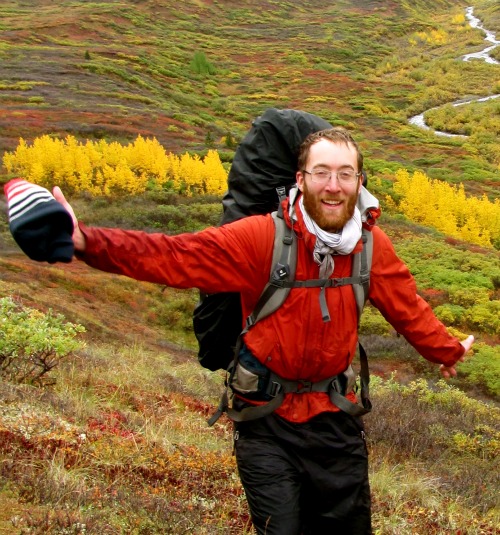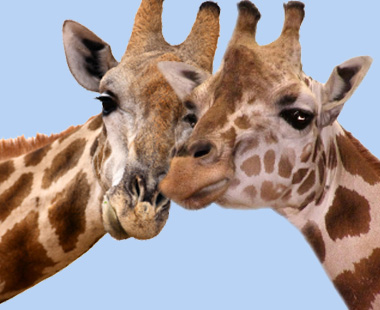 Alex Johnson exploring riotous, unpredictable Nature.Missoula-based writer Alex Johnson believes we need to queer the concept of ecology, and I’m inclined to agree. After enjoying his feature “How to Queer Ecology: One Goose at a Time” in the current issue of Orion magazine, I asked him to expand on some of his ideas.
Alex Johnson exploring riotous, unpredictable Nature.Missoula-based writer Alex Johnson believes we need to queer the concept of ecology, and I’m inclined to agree. After enjoying his feature “How to Queer Ecology: One Goose at a Time” in the current issue of Orion magazine, I asked him to expand on some of his ideas.
Q. You propose the queering of ecology. What does that mean to you?
A. Queering ecology means hosing out the pigeonholes. The queer movement bravely claims that humans are inherently capable of a much wider range of behaviors than the powers-that-be give us credit for. Queer ecology is the extension of that claim to all life on Earth. All living things, we are now learning, are capable of a wide variety of behaviors.
The most basic task of queer ecology is to throw light on “the biases and limitation of the human observer,” as Bruce Bagemihl says in the introduction to his groundbreaking Biological Exuberance. Happily, I am not the first or only “queer ecologist.” Catriona Mortimer-Sandilands has provided much of the scholarship for the burgeoning field. She co-edited the recently published Queer Ecologies, the first collection of academic essays on the subject. I expect and hope more will follow.
Q. People just love to celebrate facts proving that Nature in general and animals in particular are pure, straight, and monogamous. What’s the problem with that?
A. I wouldn’t call it love, per se, that drives people to project concepts of purity, straightness, and monogamy onto non-human life. It’s a problem of convenience. When the prevailing interpretation of sexuality in our culture is that there’s the straight (biologically fit) folks and then the gay (biologically anomalous) folks, it’s easier to assume the same thing for Nature too. The assumption is: gay geese wouldn’t stand a chance. Turns out, our prevailing interpretation is all wrong. Life doesn’t need monogamy or heterosexuality to survive. It needs riotous, messy, mysterious diversity.
Q. In your Orion magazine piece, you discuss how Nature at once celebrates and defies romanticism. What’s a good example of that?
A. Just to be clear, I don’t think the more-than-human world — individually or collectively — gives a damn how humans interpret it. I do think the irony, in certain cases, is rich. Take the non-sexual example of the bald eagle, for instance. The animal has come to represent all of those qualities that our nation romantically claims to possess: independence, determination, courage, strength, wisdom, even physical and moral cleanliness. It doesn’t take many hours of field observation of bald eagles to witness a whole variety of behaviors that don’t fit those assumptions. They often scavenge road kill. Many prefer to steal already-caught fish than try for their own. And in Juneau, Alaska, the town landfill has a special permit to shoot firecrackers at the protected birds because their opportunistic flocks have become such a nuisance.
Q. What’s your advice to activists in applying the concept of a queer ecology to their work on mineral-extraction issues, environmental justice, or the like?
A. Queer ecology begins by questioning our understanding of sexuality in relation to Nature, but it certainly does not end there. As I suggest in my essay, if straight identity means “I am,” and gay identity means “I am not,” then queer can mean “I am also.” I see no end to the application of I-Am-Also as we work to protect the integrity of the world’s ecological whole. Over the past year, I’ve been a part of a movement to stop Exxon from shipping massive mining equipment through Idaho and Montana on its way to the tar sands of Alberta. What I love about the campaign is that it’s a collection of people shouting, I am also: a local, a truck driver, a vessel of cultural wisdom, a living being. I am also: concerned about the economy, about feeding my family, about posterity. I am also: deserving of the right to fish, hunt, recreate, and live life free of cancer.
Q. How might this new perspective change science and/or the environmental movement?
A. Our popular culture often falsely concludes that truth is the foundation of science. Throughout modern history, however, the greatest scientists have tried to tell us over and over again what is really the foundation, well-spring, and unending constant of science: mystery. Queer ecology is a reminder that what we don’t know about the living world will always be far greater than what we do know — and it is an entreaty to act according to that most basic of truths.
A candidate for a master’s degree in environmental studies from the University of Montana, Johnson edits Camas: The Nature of the West and is director of outreach for All Against the Haul, working to stop the creation of a permanent tar-sands industrial corridor through Idaho and Montana. He has led conservation crews across much of Alaska and the western U.S., and this summer, he and his partner, Pete, will attempt to float the entire Yukon River in a canoe. From this journey he will produce a full-length book on the subject of queer ecology. Find his excellent blog here.



